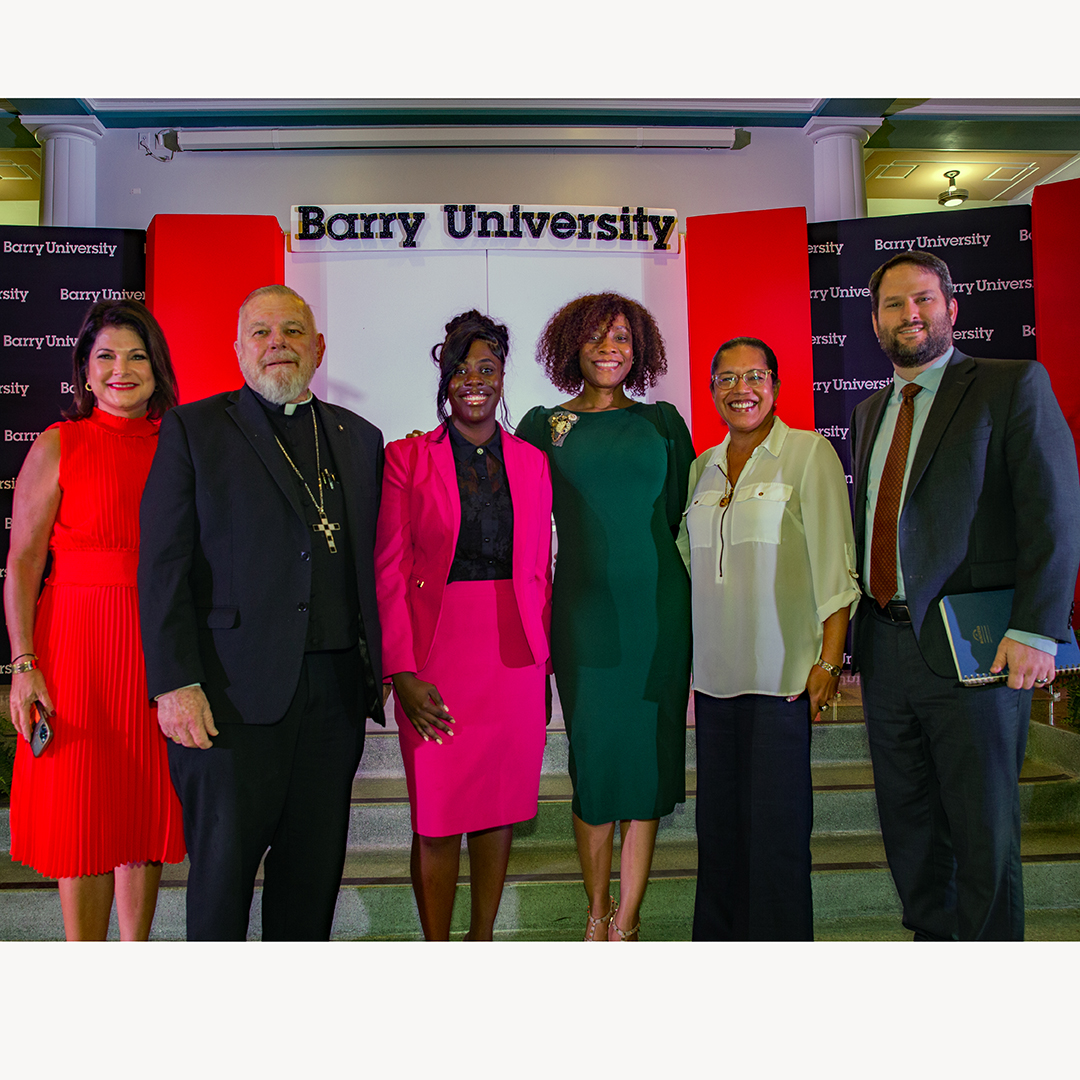By Jim Davis - Florida Catholic
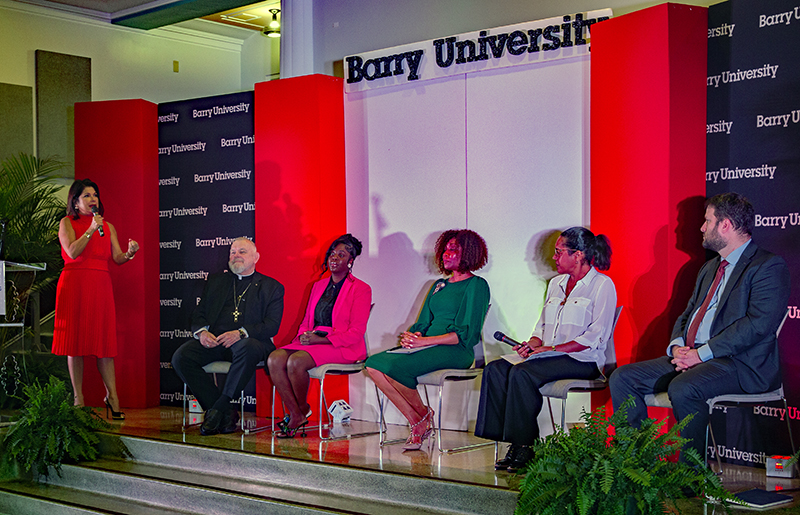
The Institute for Immigration Studies at Barry University sponsored an inaugural international immigration conference and arts festival at Barry University. From left: Jackie Nespral, panel moderator, NBC news-Miami; Archbishop Thomas Wenski, Michael's Saint-Vil, Miami Dade County Mayor's Office of the New American representative; Cassandra Suprin, Americans for Immigrant Justice; Tessa Petit, Florida Immigrant Coalition; and Joseph Kano, Catholic Legal Services.
MIAMI SHORES | Faith, law, politics, business, psychology – even the fine arts – showed the many facets of immigration as Barry University held a three-day conference on the topic.
Miami Mosaic: International Immigration Conference and Arts Festival, March 21-23, drew a total of 1,301 people. The conference dealt with issues such as work, health, language, psychology, human rights, even sex and labor trafficking.
The gathering was offered by Barry’s Institute of Immigration Studies. The three-year-old institute supports archives, lectures, art projects and an immigration studies minor at the university.
“We want to form a bridge to bring students, faculty and community groups into one place,” Giselle Elgarresta Rios, director of the institute, said in an interview.
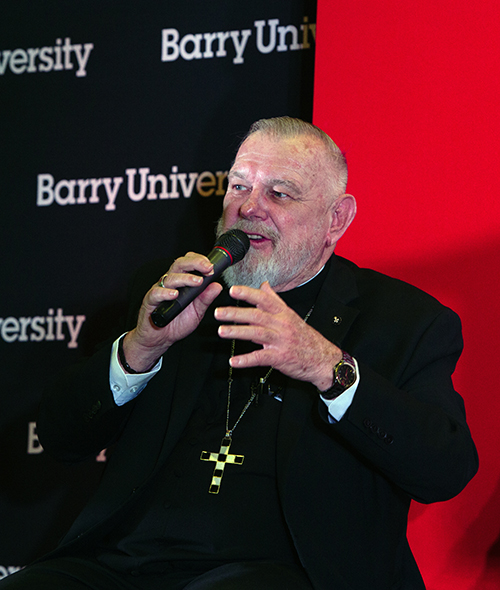
Archbishop Thomas Wenski speaks during a panel discussion at the immigration conference March 21, 2024, at Barry University.
Keynoting the conference was a panel discussion on the state of South Florida immigration. Archbishop Thomas Wenski, one of the five panelists, began his contribution even before the talk began, during his opening prayer.
“Your Son was a migrant, coming to Earth,” he prayed. “He was a political refugee in Egypt. Therefore, immigration has been part of Church history. Help us to see in our migrant brothers and sisters the Lord Jesus Christ.”
The panelists gave some eye-opening numbers on immigration.
Joseph Kano, an attorney for Catholic Legal Services, said Florida has been a destination for people from Venezuela, Nicaragua, Cuba and Haiti over the last two years.
Michael’s D. Saint-Vil, of Miami-Dade’s Office of the New American, said arrivals have been averaging 100-1,000 per week from Cuba, 200-600 from Haiti, and 100-200 from Colombia.
The facts lent force to Elgarresta Rios’ assessment of Miami-Dade: “The minority is the majority.”
NBC-6 anchor Jackie Nespral, serving as moderator, noted that immigration had gained more attention in the current news cycle. She mentioned the legal battle over Texas’ current border policy.
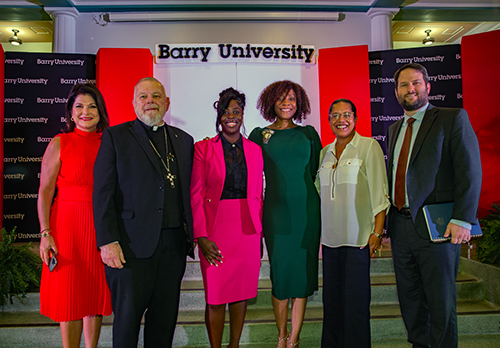
The Institute for Immigration Studies at Barry University sponsored an inaugural international immigration conference and arts festival at Barry University. From left: Jackie Nespral, panel moderator, NBC news-Miami; Archbishop Thomas Wenski, Michael's Saint-Vil, Miami Dade County Mayor's Office of the New American representative; Cassandra Suprin, Americans for Immigrant Justice; Tessa Petit, Florida Immigrant Coalition; and Joseph Kano, Catholic Legal Services.
Nespral, herself the daughter of immigrants from Cuba, cited also the recent decision by Florida Governor Ron DeSantis to send the National Guard to patrol the waters off South Florida against the “possibility of invasion” of Haitian refugees.
The governor’s order rankled Archbishop Wenski for its antagonistic tone. He said the current crisis in Haiti – with armed gangs overrunning most of Port-Au-Prince, the capital – is just the latest in a chain of tragedies there.
“Haitians are not an invasive species; Haiti is having an ongoing crisis,” the archbishop said. “It needs solutions, and there are no easy answers yet.”
Much of the antagonism springs from fear, in the view of panelist Tessa Petit, family service director for Americans for Immigrant Justice.
“Immigrants become dehumanized,” Petit said. “This country has been a safe haven for those running to seek safety. Kicking people when they're down is not the American way.”
During the last 15 months, Archbishop Wenski said, Miami-Dade has grown by a quarter-million people. “That is totally from immigration. Yet we don’t hear complaints like in Chicago or Washington, D.C. Immigrants are mostly welcomed by relatives and friends.”
Petit praised the use of community ID cards in Miami-Dade, which allow immigrants to rent apartments and open bank accounts. She added, however, that some municipalities don’t accept the cards.
Kano called for governments to relax laws on occupancy. He said the laws force some immigrants to live at shelters, instead of with relatives who already live here.
“I've seen a lot of young, intelligent people who should be on the path to success,” Kano said. “Instead, they’ve had to go to a shelter like Camillus House.”
The panelists also faulted law enforcement groups that link crime to immigrant status. Petit said undocumented immigrants don’t report crimes for fear they’ll be deported.
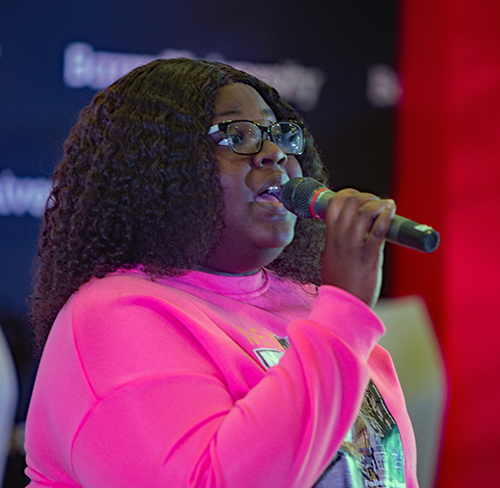
Barry University music student, Nicolette Raphael, sings a Haitian prayer, "A Lot of Rocks" before a panel discussion, March 21, 2024, at immigration conference at Barry University.
One problem, Saint-Vil said, is that employers, landlords and law enforcement officials are often unaware of current immigration laws and policies. “So it’s not about just educating immigrants, but also employers.”
Archbishop Wenski sympathized. “It’s easy to get lost in the weeds of various policies on immigration. People have to wait 10 to 14 years for their day in court.”
He called for updating the registry provision of federal law. The original form in 1929 said that an immigrant who had arrived in 1921, and showed “good moral character,” could pursue legal residency without being deported.
The provision has been updated several times, with the current arrival cutoff set at 1972. Archbishop Wenski recommended resetting it to 2014.
“It could be 15 words long, and it could legalize 10 million people,” the archbishop said. “It would eliminate the backlog.”
Panelist Cassandra Suprin of Americans for Immigrant Justice suggested another simple measure: listening to immigrants themselves.
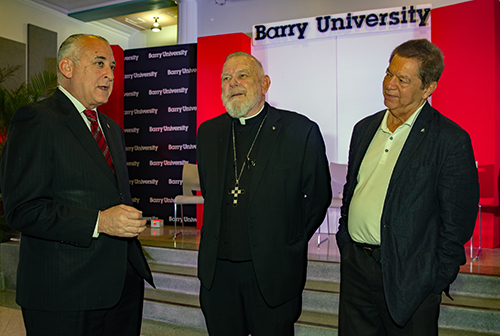
From left: Esteban Bovo, mayor of Hialeah; Archbishop Thomas Wenski and Peter Routsis-Arroyo, executive director of Catholic Charities of Miami speak after a panel discussion, March 21, 2024, at immigration conference at Barry University.
“People are talking about Haiti, but we’re not part of the discussion,” said Suprin, who directs the organization’s Family Defense Program. “Instead of saying what Haiti needs, they should say, ‘How can we help you?’ ”
The varied offerings at the conference brought varied conferees. Damarys Rangel, president of Derechos Humanos, said she'd driven from Orlando just for the unit on human trafficking. She also valued the updated facts on immigration.
“People should have access to their rights,” Rangel said. “There’s a lot of missing information.”
Argentina-born Maria A. Bilbao said it took 18 years for her to normalize her status in the U.S. She now helps other immigrants as Florida campaign manager with the American Friends Service Committee.
“This is a matter close to my heart,” Bilbao said. “There will be a lot more undocumented people if there’s no permanent solution.”
